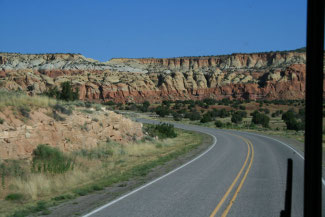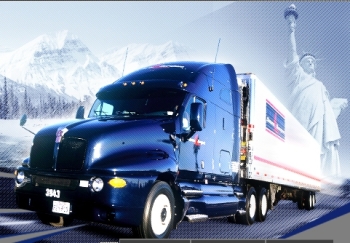Choosing A Truck Driving Job Part VII: Tankers and Flatbeds
-
Blogs By Author
-
Blogs By Tag
In part 1 of our series, Choosing A Truck Driving Job Part I: Factors That Effect All Companies, we talked about different factors and considerations which will affect your experience at any company you go to work for.
In part 2, Choosing A Truck Driving Job Part II: You and "Your People" Are The Most Important Factor, we talked about surrounding yourself with the right people, understanding factors that affect the freight you'll be getting, and things you can do to put yourself in the best position to succeed.
In part 3, Choosing A Truck Driving Job Part III: How Your Family and Lifestyle Will Affect Your Choice, we considered your personality and lifestyle. Are you married? Do you have children? Do you love adventure? How long would you like to be away from home? These questions all figure into the process of choosing the right truck driving job.
In part 4, Choosing A Truck Driving Job Part IV: Advantages of Large Trucking Companies, we of course talked about the advantages of working at a large trucking company.
In part 5, Choosing A Truck Driving Job Part V: Comparing Large Trucking Companies To Small Ones, we compared working for companies of different sizes.
In part 6, Choosing A Truck Driving Job Part VI: Dry Van and Refrigerated Companies, we talked a little bit about life on the road with a dry van or a refrigerated carrier.
Now, in part 7, we'll talk a little bit about driving for a tanker or flatbed carrier.
You'll find that there isn't too much of a difference between driving for a dry van carrier vs a refrigerated carrier, but pulling a tanker or a flatbed is a whole different thing altogether. There are some significant differences between the lifestyles and the job duties of flatbed and tanker drivers.
Flatbed

Pulling a flatbed is a unique way to make a living in trucking, and if you ask anyone that does it they'll tell you there's nothing easy about it. Well, most "flatbedders" are rather tough guys and now that I think about it, they might tell you there's nothing to it. And for them, it's probably mostly true. It has its moments for sure, but overall most people that make their living this way enjoy the physical work, and enjoy the unique challenges that come along with it.
Some of the differences are obvious - you have to use chains or straps to hold down your load, and often times you have to tarp the load to protect it from the elements. These jobs are often tedious at best, difficult most of the time, and there are a number of rules and regulations that govern the methods used to secure your load. The DOT rules loosely specify the types of equipment you must use, along with some of the techniques you must use to secure the load. And believe me, the DOT is watching closely!
I used to be relieved anytime I pulled into a weigh station and there was a flatbed ahead of me. Chances are, if the DOT is interested in checking somebody out, the flatbeds oftentimes go first. I pulled dry van the vast majority of my years on the road, and we were far less interesting to the DOT than the flatbeds, for obvious reasons.
The work of securing and releasing your load is quite physical, and oftentimes quite difficult. The tarps, chains, and straps are quite heavy and often you are out in the weather getting the load secured or released by yourself. The tarps, straps, and chains get wet, icy, and very hard to handle in poor weather, not to mention you're out there crawling around on the load trying to get everything situated. It can be quite dangerous. I've heard many, many stories of serious injuries from guys falling off of trailers.
Now there are some advantages to pulling a flatbed also. Often the tractor and the load you have are far shorter in height than your standard trucks, so it's much easier to fit under low bridges in the cities. Also, the lower profile helps the crosswinds go around you a bit better on slick roads in the wintertime. And lastly, it's an interesting way to make a living. There's always a new challenge, a variety of different types of loads to secure, and there's a bit of a camaraderie amongst the flatbed drivers. It's an interesting and challenging form of truck driving, but I wouldn't recommend it to anyone who isn't the hardy type.
Liquid Tankers

Now I pulled a food grade tanker for a year one time and I really enjoyed it. I never pulled a chemical tanker and I was never too interested in doing so. I wasn't too big on the idea of being around a lot of hazardous materials or pulling HAZMAT loads very often.
Food grade tankers are interesting though. There are no baffles in the tank, so there is nothing to keep the liquids from sloshing around. It takes a bit of time to learn how to shift the truck because the liquid sloshing will thrust or slow down the truck enough that the shift won't execute at the speed you're now going. You have to "time" your shifts in order to get rolling. It's no big deal, but it takes some practice.
You also have to be extra careful on slick roads, in turns, and when braking. That liquid moves all over the place and you have to always be aware of what it's going to do before you try maneuvering the truck. You don't get too many second chances if you try to make too aggressive of a move.
Also, you have to get the tank washed out after almost every load. This can take a lot of extra time, and mean a bunch of extra running around in between loads. But, at times it's a relief because a two hour nap is just what the doctor ordered!
Lastly, you do have to help unload the truck at times by hooking up some hoses. Most liquid tankers also have hydraulic pumps on the back and sometimes you'll have to run the pump to unload the tank. Again, it's not a big deal, but it comes with the territory.
The advantages to pulling a liquid tanker are that the crosswinds flow around the tank nicely, you don't have to worry about getting your axle weights adjusted because the liquid is self-balancing, and most of the tractors and tanks are fairly short in height, so low bridges aren't as much of a concern.
Most new drivers won't be dealing with companies that haul bulk shipments in dry tankers, like flour, sugar, and sand, but there isn't too much of a difference in the job and lifestyle from that of a liquid tanker. There are far more local jobs for dry bulk tankers, though, than there are over the road jobs.
So as you can see, there are some significant differences in job duties and lifestyles if you're going to be pulling a tanker or a flatbed vs a dry van or a refrigerated trailer.
In the final part of our series we're going to talk about one of the best ways to find out if a company you are considering driving for is one you might be happy with.
Related Articles:







 TT On Facebook
TT On Facebook